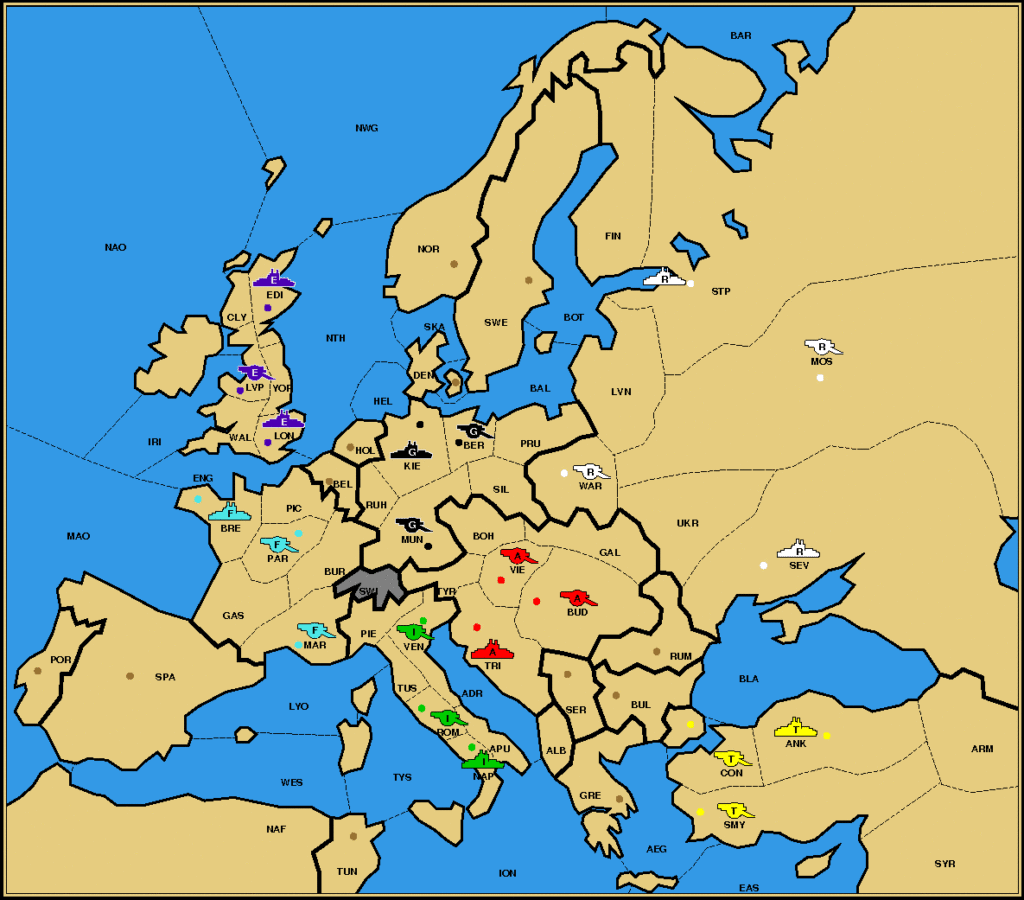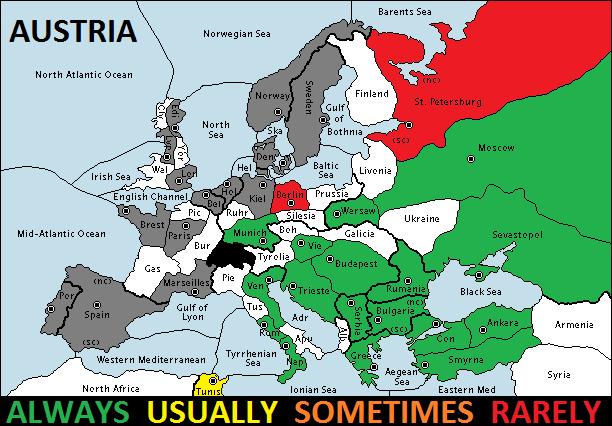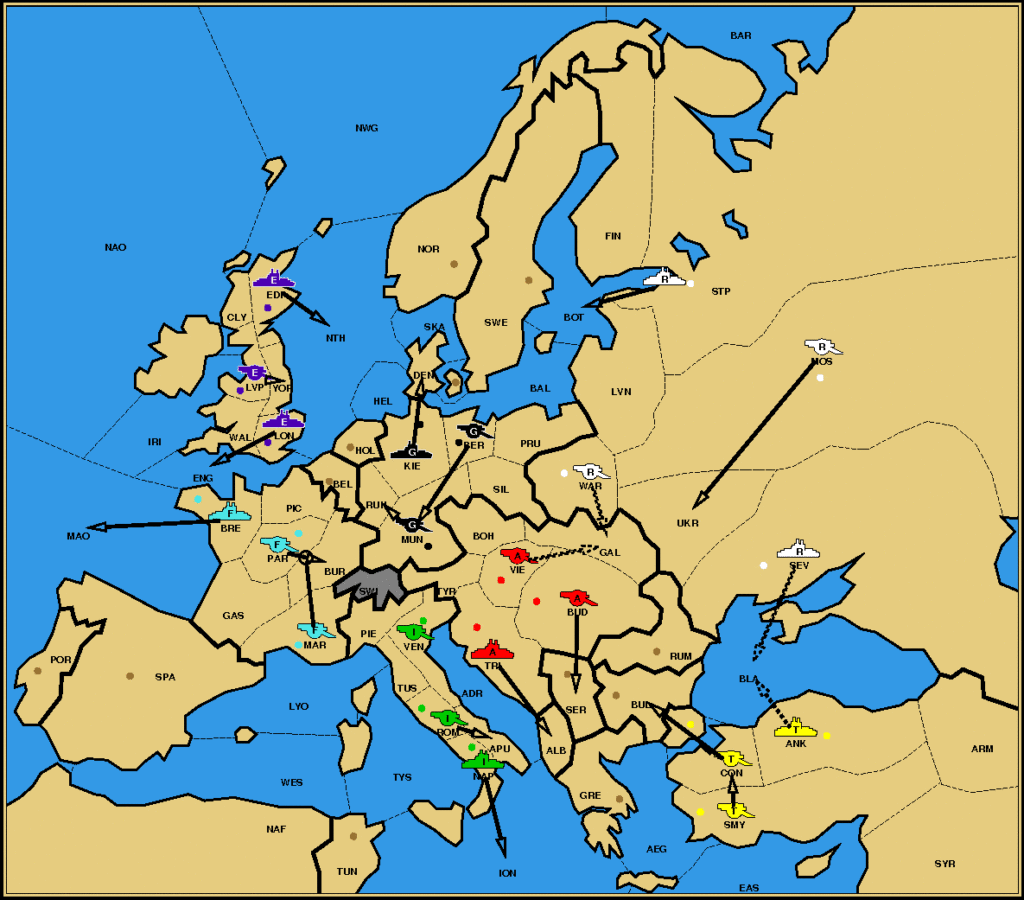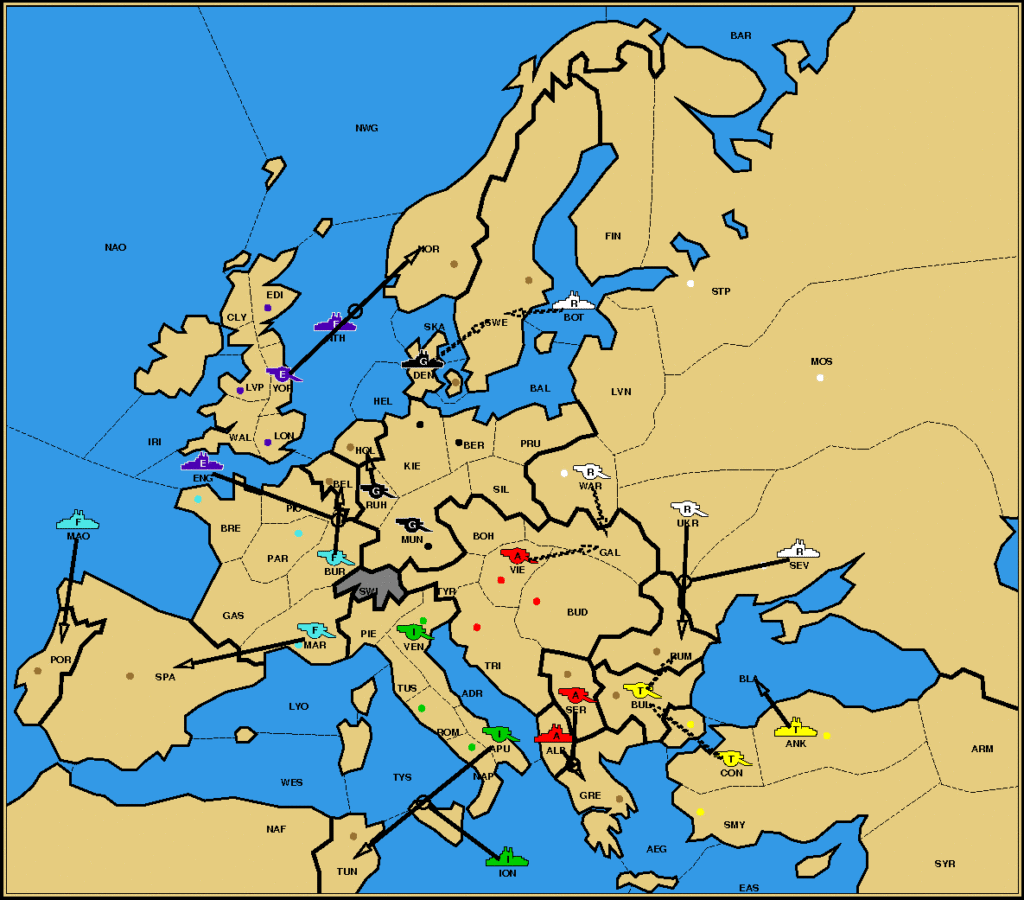Austria Again!

In games I’ve played on the standard board, I have been Austria more than any other power (nearly 1 out of 4 games). There is a feature (if enabled by the GM) to enter your preference for which power to play. I don’t normally enter a power and I suspect that is why I have frequently been Austria (I have read that people generally don’t like being Austria).
I enjoy playing as Austria because of the potential of the Austria-Italy alliance (particularly in gunboat – I like other alliances just as much, if not better, in press). This works out well if a 3rd power from the north/west emerges for a solid 3-way draw. It works out even better if the Italian player makes mistakes and a solo attempt materializes. Things can go bad if Italy is very good because they usually end up with the best chance to solo.
Spring 1901 Plan
If you are looking for an analysis of the potential openings for Austria and its neighbors, this is not the blog entry for you. I’m looking to see what players usually do here (whether it’s the best thing or not).

Since I don’t frequently join gunboat games, I decided to look at the past 10 games in this series to analyze the openings of Italy, Russia, and Turkey. Typically, Russia has opened to Gulf of Bothnia, Galicia, Ukraine, and the Black Sea while Turkey has opened to Bulgaria, Constantinople, and the Black Sea. Italy usually has gone to the Ionian Sea, Apulia, and then Venice frequently has supported Trieste.
The combined 130 movements of these powers in the previous 10 games were exactly as I’ve described 82% of the time (Italy and Turkey made up most of the variances). Some of those variations were minor differences (like Rom-Nap or Ven hold). The major differences have been whether or not Italy pesters France, once when Russia opened north, Turkey moving its fleet to Constantinople in the spring, and the one time Italy attacked Austria (that game ended in an EG draw).

Odds are that the Italian player starts out the same way as 9 out of the last 10 Italian players in this series and doesn’t attack me. It’s likely that Russia opens south, either against me or Turkey. Turkey is the question mark, but I view Turkey as a poor ally for Austria in gunboat (no way to negotiate a good alliance with them). Thus, I’ll stick with my preferred opening: F Tri-Alb, A Vie-Gal, and A Bud-Ser. This opening assumes peace with Italy. If I don’t have that in gunboat, I think I’m done no matter what I do.
Regarding England, France, and Germany, their spring movements will affect me later but won’t affect what I do right now. Therefore, I’m not considering them in planning my spring movements.[1]I’ve never seen Germany opening south to Austria in gunboat or press, so I’m not considering that scenario either. I agree with all the expert advice saying that it is important to pay attention to the other players who are not your immediate neighbors. If I survive long enough, one or more of them will eventually interact with me. Watching them now will help me to know how they play, what their tactics are, and to also keep an eye out in case one of them pulls away from the pack early and becomes a solo threat. However, they won’t affect my opening movements so I’m not studying past opening movements for them.
Spring 1901 Movements

One of the things I’ve learned from BrotherBored is to try to understand the reason for the movements of other players, even when there is no direct communication (i.e., gunboat). Spring 1901 is fairly simple from the standpoint of the movements themselves. Yet, the first clues of a players mindset are there:
Turkey, Russia, & Italy
My neighbors that impact me the most have all taken the most standard openings. There are several possible reasons.
- Perhaps they hoped the other players would make poor openings (which they could take advantage of with these standard openings).
- Many players start out conservative and standard openings are conservative.
- The players may be novices (not likely).
- Maybe they hate playing as these powers and simply did the typical openings.
These openings do not mean they are beginners or are mailing it in. I believe it is important to think more highly of others than to believe someone else is stupid or inexperienced.

Germany, France, & England
On this map, my opinion is that the most intrigue is in the west.
- Germany’s opening conveys a desire to influence Belgium but not allow France to threaten Munich.
- Perhaps Germany is anti-French?
- Is the German player conservative?[2]After the game, the German players took exception to this question: “I don’t think I’m conservative, but that particular opening is flexible. From Munich, it has a shot at BUR and TYR or simply to prevent the embarrassing RUH – MUN when F does move to BUR.” I agree … Continue reading
- France’s opening forcefully took Burgundy along with the standard opening to MAO.
- Perhaps France is anti-German?
- Is the French player aggressive? Or, does the support into Burgundy indicate a conservative player?
- England’s opening is the most forceful, threatening Brest and/or influencing Belgium.
- Perhaps England is anti-French?
- Is the English player a risk-taker (correctly assuming that Russia would open south)?
These openings are not abnormal and there are many possible reasons (beyond what I listed) for why these movements were made. At this point, very little can be reasonably assumed.
Fall 1901 Plan
My plan for Fall 1901 is very simple: take Greece and (probably) bounce Russia in Galicia again. Instead of Vie-Gal, I could put in a support or convoy order to try to convey a desire to ally with Russia or Turkey.[3]Such as Vie c War-Swi or even Vie s War-Gal. However, I don’t want to waste a move trying to convey a desire to work with or make peace with Russia or Turkey if they are already set in their minds on attacking me. If that is the case, it’s better for me to stop Russia from getting a head-start on attacking me. While my movements will most likely be interpreted as preparing for what typically happens, (Austria-Italy vs. Russia-Turkey), I don’t have a problem with that. As long as Italy actually moves towards a Lepanto, Turkey will be too preoccupied deflecting that to stop me from getting into the Aegean Sea while my armies hold off Russia.
Thus, I’m entering Alb-Gre, Ser s Alb-Gre, and Vie-Gal.
Fall 1901 Movements

This is why I don’t bother predicting what a player will do in 1901 – I have no idea! Here is what I can glean so far about the players and their approach to the game:
Turkey: Anti-Russian?
Turkey took a shot at Rumania! In my opinion, a Turkish player who is against Russia is a very good thing for Austria in gunboat. It is still possible this player is a novice player who simply doesn’t know what to do. I don’t see much else to ascertain about this player yet. I wouldn’t be surprised by an army or a fleet build from Turkey (army to go against Russia or fleet to head off a Lepanto).
Russia: Pro-Turkey?
Russia supported an army into Rumania instead of their fleet. From my point of view, this is typically a pro-Turkish move (no chance of a fleet build in Sevastopol). Germany bounced Russia out of Sweden and now Russia has an English army next to St. Petersburg. The Russian player has a tough path ahead.
It’s still hard to gather much from their movements aside from an indication that they want to ally with Turkey. They have made what I consider to be standard movements. I think their build will be very telling about what they plan to do and what their temperament is.

Italy: Detail-oriented & intentional
Italy ordered as hoped! Here are two things I can glean from their spring and fall movements:
- Hold orders were intentionally entered for Venice in both the spring and the fall.[4]If an order is not entered, it will show up in the order adjudication as “Italy: A ven NMR” (which is functionally the same as a hold order). Instead, the order adjudication showed up as “Italy: A ven H” which means the player intentionally entered a hold order. That tells me that this player pays attention to details and takes the time even to enter a hold order.
- Italy ordered Rome to Apulia instead of Naples. Instead of issuing a support order from Venice for Trieste in the spring, Italy issued a hold order. There was no convoy order to suggest a desire for peace. Italy has made movements that are supportive of an Austria-Italy alliance and/or Lepanto but Italy has not made movements that would allow me to stab him. Italy has also not made movements that explicitly show support for me. These details again show me that Italy pays attention to details and is cautious about an Austrian attack. At the very least, Italy doesn’t want to appear to leave an opening or appear to be Austria’s biggest fan.
Germany: Not able to be neutral with France
The most noteworthy movements are that Germany bounced Russia and issued a hold order in Munich. [5]Moving to Holland doesn’t count as noteworthy, except that they didn’t try to bounce anyone in Belgium which would have simply been antagonistic. After seeing the English support of France into Belgium, I would assume Germany feels regret at bouncing Russia out of Sweden and not taking an anti-French stance by ordering Munich to Burgundy. The German player’s use of a hold order here indicates to me that they were not taking a stance for or against France. Now that England has explicitly supported France, Germany probably has no choice.
France: Aggressive/offensive oriented
A 3-build France in 1902 is a very powerful France, especially when supported by the English player! The French player went with offensive-thinking movements in moving MAO-Por instead of covering Brest (this implies to me that the spring move to Burgundy was offensive in nature instead of defensive). The gamble paid off for him in a stunning way!

England: Pro-French?
England opened to the Channel, only to support France into Belgium! This player immediately appears to be very pro-French. There is the possibility of wanting to use an alliance with France to grow some and then stab France later (hence the move to the Channel). In my opinion, he’s playing with fire but this may go very well for him. England-F can be a very powerful alliance (like a reverse Juggernaut).
One other aspect of this is that moving to the Channel did not at all betray his intentions for the fall. If he wanted to support France into Belgium all along, he could have opened completely northern but he didn’t do that. The opening to the Channel indicates either a plan to eventually betray France or a desire to ally with France while not completely opening the door to a French stab in a couple years.
Overall, I think this is starting out to be an intriguing game!
BOUNCED Gunboat Journal—Table of Contents
Introduction
1901 | 1902 | 1903 | 1904
1905 | 1906 | 1907
Elimination
Conclusion
End of Game Statements
Footnotes
| ↑1 | I’ve never seen Germany opening south to Austria in gunboat or press, so I’m not considering that scenario either. |
|---|---|
| ↑2 | After the game, the German players took exception to this question: “I don’t think I’m conservative, but that particular opening is flexible. From Munich, it has a shot at BUR and TYR or simply to prevent the embarrassing RUH – MUN when F does move to BUR.” I agree with the German player; this is a pragmatic opening. |
| ↑3 | Such as Vie c War-Swi or even Vie s War-Gal. |
| ↑4 | If an order is not entered, it will show up in the order adjudication as “Italy: A ven NMR” (which is functionally the same as a hold order). Instead, the order adjudication showed up as “Italy: A ven H” which means the player intentionally entered a hold order. |
| ↑5 | Moving to Holland doesn’t count as noteworthy, except that they didn’t try to bounce anyone in Belgium which would have simply been antagonistic. |
